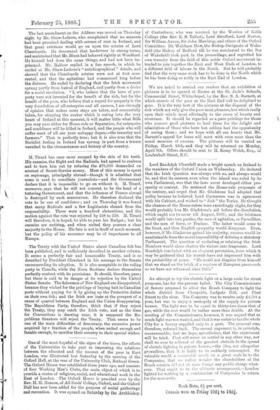The Treaty with the United States about Canadian fish has
been published, and is sufficiently described in another column. It seems a perfectly fair and honourable Treaty, and is so described by President Cleveland in his message to the Senate recommending its adoption. It is also acceptable to the ruling party in Canada, while the Nova Scotians declare themselves perfectly content with its provisions. It should, therefore, pass ; but there is said to be danger of its rejection by the United States Senate. The fishermen of New England are disappointed, because they wished for the privP.ege of buying bait in Canadian ports without paying for it by giving up the Protective duties on their own fish; and the Irish are irate at the prospect of a cause of quarrel between England and the Union disappearing. The Republican Party, therefore, think that if they reject the Treaty, they may catch the Irish vote; and as the time for Conventions is drawing near, it is supposed the Re- publican Senators will reject the Treaty. That seems to be one of the main difficulties of democracy, the excessive power acquired by e. fraction of the people, when united enough and fanatic enough, to sacrifice their country to their special wishes.






































 Previous page
Previous page